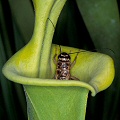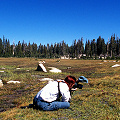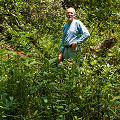Q: How can I help save carnivorous plants from extinction?

Sarracenia flava

Conservation research

Sarracenia jonesii
restoration site
A: You can help in many ways! Here are a few.
- Maintain your respect and passion for the
outdoors. Be easy on the habitat. NEVER POACH (i.e. field collect illegally) or
introduce new species to environments.
- Remember the environment when you vote. If you are
particularly interested in carnivorous plants, remember they live
in wetlands---caring for these habitats should be a high priority for you.
- You should consider joining a carnivorous plant society to keep updated on how plants are
faring in the wild. For example, a fine idea would be to join the
International Carnivorous Plant Society. It is an excellent society
with fine benefits and a strong conservation agendum.
- The North American Sarracenia Conservancy (NASC) has done some great things
for Sarracenia conservation. You might want to find out what they are up to.
- Perhaps you should join The Nature Conservancy (TNC).
It is an extremely successful, national nonprofit organization involved
in protecting land through direct purchase, conservation easements, and partnerships. It operates in
a nonconfrontational, largely apolitical manner, and has an
excellent history of wetland protection. Look at its web site for more detailed
information. In addition to becoming a member, you can can also volunteer at their many offices
throughout the USA.
- There are other organizations which are doing great jobs too, many small
local factions are very energetic. Support the work of your local conservation
organizations. I do not necessarily mean pay them money---do some volunteer
work with them. You will meet dynamite people. If you are single, maybe that special someone....
If you are both single and promiscuous, maybe you'll meet those special eight people...
- Educate others about the value of wild lands, habitats, and
plants. Let them know that "swamps" are not
eyesores and wasted land!
- If nothing else, try to minimize your imprint upon the land by conserving resources. Recycle, use less air conditioning, be sensible about your conservation decisions.
Page citations: personal observation.